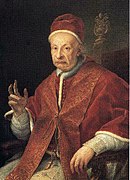Papal conclave, 1724

Coat of arms during the vacancy of the Holy See
|
|
| Dates and location | |
|---|---|
| 20 March – 29 May 1724 Apostolic Palace, Papal States |
|
| Key officials | |
| Dean | Sebastiano Antonio Tanara, Vincenzo Maria Orsini |
| Sub-Dean | Vincenzo Maria Orsini, Francesco del Giudice |
| Camerlengo | Annibale Albani |
| Protopriest | Galeazzo Marescotti |
| Protodeacon | Benedetto Pamphili |
| Elected Pope | |
|
Vincenzo Maria Orsini (Name taken: Benedict XIII) |
|
 |
|
The papal conclave of 1724 was called on the death of Pope Innocent XIII. It began on 20 March 1724 and ended on 29 May that year in the election of Vincenzo Maria Orsini, a Dominican friar, as Pope Benedict XIII. Benedict resisted his own election, and was only convinced to accept his election as Pope by the head of the Dominican order.
The papal conclave that elected Innocent XIII in 1721 was dominated by cardinals appointed by Clement XI who had been Pope for twenty-one years and appointed over seventy cardinals during that time. The subsequent conclave that elected Innocent was marked with a new alliance between the French cardinals and Spanish cardinals due to a change in the Spanish dynasty. Innocent was elected unanimously under the prospect that he might cooperate with both France and the Holy Roman Emperor.
Upon the death of Innocent XIII the composition of the conclave and its factions were similar to the one that had elected him. The conclave began on 20 March 1724, and the cardinals who had gathered made several attempts to select other unlikely candidates to the papacy, but none were successful and the conclave continued through May 1724. On 29 May 1724 the conclave unanimously elected Cardinal Orsini as Pope. Orisini's election was notable at the time because it was unusual for the cardinals to elect friars, since they were seen by some as too rigid. Members of religious orders at the time were often respected by the cardinals, but rarely elected, with Benedict XIII being only the fourth since the Council of Trent. Orisini was seventy-five at the time and had resisted his own election. Unlike the other mendicants elected to the papacy in this period, he was of noble birth, being born the eldest son of the Duke of Gravina, but had forfeited his rights to his father's title in order to enter the Dominicans.
...
Wikipedia
